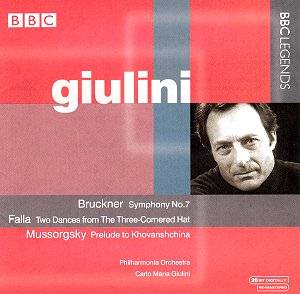Comparison Recordings:
Bruckner Symphony #7. Eugen Jochum, Berlin PO.
DG 429 086-2
In one sense a Bruckner Symphony is rather
like a bad case of the flu: while youíre sick you donít remember
what itís like to feel well, and when youíre well again you donít
remember being sick. When listening to Bruckner you enter a universe
where time flows at a different rate, and the shock of re-entry
into the ordinary world can erase all memories. Some years ago
when the Günter Wand recording of the Fifth Symphony
came out I listened to every recording available to me, some six
in all, and I donít remember anything else that happened that
whole week. (In case youíre curious, yes, the Wand recording,
with the Berlin PO, was significantly superior to all the competition.)
The first movement of the Seventh Symphony
is for my money the finest music Bruckner ever wrote; if I had
been present at the Proms the night this recording was made, I
would have lurched blearily out of the hall at the end of the
first movement and found a (relatively, for London) quiet place
to gaze at the moon and cry until I fell asleep. However, even
though this is probably the finest performance of the whole Symphony
ever recorded (donít take my word for it, listen to the
audience screaming at the end of the work. My God, they sound
like Americans! Fortunately for the dignity of England,
the engineers faded out this unseemly and riotous jammering with
abrupt dispatch and then with only a decent brief interval went
on bouncily into the Falla) itís not the best performance of the
first movement. Giulini, like a sensible opera composer, pulled
the punch at the end and deliberately doused the climax. That
makes you listen through the rest of the symphony before you can
get off at the proper end of things, and a right proper end of
things it is! For a whole Bruckner Seventh Symphony, as
I said, this is probably the best youíll ever hear it. The sound,
while not exceptional, is the best Iíve ever heard on any "BBC
Legends" issue, as it would have to be for the Bruckner to
come through so vividly. The BBC engineers understood that they
faced a challenge and overcame it in good form.
But for me Iíd rather put on my clothes and go
home at the end of the first movement. One Bruckner movement is
all one ought to consume in a given day, especially the First
of the Seventh which is as dependable a spiritual/æsthetic
orgasm as the First of Mahlerís Eighth. With the properly intense
ending, played no-holds-barred to the finish, like Eugen Jochum
on DG. As to how Jochum does the rest of the symphony, Iím not
all that sure, (as I said, one sometimes doesnít remember) but
I donít think he does quite so well as Giulini. Jochumís sound
[also ADD] is better, though, but not much. Jochumís timings are
10% slower in the first movement, nearly 20% slower in the adagio,
but roughly equal on the last two movements.
Giulini and Bruckner are both Catholics. Since
Iím not a Christian, technically Iím not either Catholic or Protestant,
but from growing up in a small town in the USA Iím sort of culturally
a Protestant. I was one of only four in my sixth grade class who
didnít want to leave school an hour early on Tuesdays to go to
church, so I had to sit there with the others and pretend to read
a school book while the teacher read a magazine and did her hair
until we could all go home at 3PM. But I relate very much to the
rich spirituality of Catholicism (even as I join with my Catholic
friends in deploring many of the Churchís administrative and social
policies) and as a result I feel a strong personal affinity with
Bruckner (as, for other examples, with Szymanowski, Haydn, Stravinsky,
and Rimsky-Korsakov). Alan Watts seemed to feel that Protestant
spirituality is a contradiction in terms; evidently he was unaware
of the Messiah and the St. Matthew Passion. At any
rate, Giulini and I both feel this is religious music, and thatís
probably why I like his version of it. But if you like your Bruckner
brisk, bright, and four-square to the bar, you may not like this
recording.
As to the encores, theyíre quite well played,
and the audience liked them, too, even though theyíre all but
inaudible in the brilliance from the Bruckner. Nobody would buy
this disk for them alone. But if you love Bruckner, or even if
you donít yet love Bruckner, you will most likely want
this disk in your collection.
Paul Shoemaker
